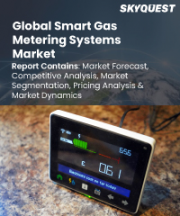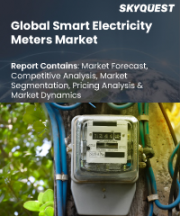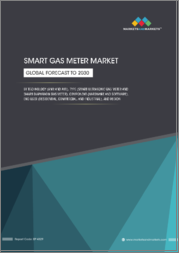
|
시장보고서
상품코드
1666046
스마트 가스 미터 시장 규모, 점유율, 성장 분석 : 컴포넌트별, 유형별, 기술별, 최종사용자별, 지역별 - 산업 예측(2025-2032년)Smart Gas Meter Market Size, Share, and Growth Analysis, By Component (Hardware, Software), By Type (Smart Ultrasonic Gas Meter, Smart Diaphragm Gas Meter), By Technology, By End User, By Region - Industry Forecast 2025-2032 |
||||||
스마트 가스 미터 시장 규모는 2023년 37억 달러로 평가되었습니다. 2024년 39억 6,000만 달러에서 2032년에는 68억 6,000만 달러로 성장할 것으로 예상되며, 예측 기간(2025-2032년) 동안 7.1%의 연평균 복합 성장률(CAGR)을 보일 전망입니다.
스마트 가스 미터 시장은 상업, 주거, 산업 분야에서 온도, 부피, 압력 등 가스 특성을 자동으로 측정하는 수요가 증가함에 따라 큰 성장이 예상됩니다. 규제에 의한 압박과 스마트 가스 미터 제조업체와 가스 개발 기업 간의 협력 관계가 시장 확대의 원동력이 되고 있으며, 전 세계적으로 두 자릿수 성장이 예상되며, 4G와 5G를 포함한 디지털 기술과 강력한 통신 네트워크의 개발은 혁신적인 스마트 가스 미터 개발을 촉진하고, 시스템의 지속가능성, 효율성, 지속가능성, 효율성 시스템의 지속가능성, 효율성, 연결성을 높이고 있습니다. 안전 기준, 데이터 분석, 스마트 가전과 같은 기술적 개선이 강조되고, 세계 수요 증가에 대응하기 위해 제조업체들이 지속적으로 기술 혁신을 하고 있기 때문에 시장은 성장할 것으로 보입니다.
목차
서론
- 조사 목적
- 조사 범위
- 정의
조사 방법
- 정보 조달
- 2차와 1차 데이터 방법
- 시장 규모 예측
- 시장 전제조건과 제한
주요 요약
- 세계 시장 전망
- 공급과 수요 동향 분석
- 부문별 기회 분석
시장 역학과 전망
- 시장 개요
- 시장 규모
- 시장 역학
- 성장 촉진요인과 기회
- 성장 억제요인과 과제
- Porter의 Five Forces 분석
주요 시장 인사이트
- 중요 성공 요인
- 경쟁 정도
- 주요 투자 기회
- 시장 생태계
- 시장의 매력 지수(2024년)
- PESTEL 분석
- 거시경제 지표
- 밸류체인 분석
- 가격 분석
- 규제 상황
- 사례 연구
- 기술 진보
스마트 가스 미터 시장 규모 : 구성요소별&CAGR(2025-2032년)
- 시장 개요
- 하드웨어
- 소프트웨어
스마트 가스 미터 시장 규모 : 유형별&CAGR(2025-2032년)
- 시장 개요
- 스마트 초음파 가스 미터
- 스마트 다이어프램 가스 미터
스마트 가스 미터 시장 규모 : 기술별&CAGR(2025-2032년)
- 시장 개요
- 자동 원격 검침(AMR)
- 지능형 검침 인프라(AMI)
스마트 가스 미터 시장 규모 : 최종사용자별&CAGR(2025-2032년)
- 시장 개요
- 주택
- 상업
- 산업
스마트 가스 미터 시장 규모 : 지역별&CAGR(2025-2032년)
- 북미
- 미국
- 캐나다
- 유럽
- 독일
- 스페인
- 프랑스
- 영국
- 이탈리아
- 기타 유럽
- 아시아태평양
- 중국
- 인도
- 일본
- 한국
- 기타 아시아태평양
- 라틴아메리카
- 브라질
- 기타 라틴아메리카
- 중동 및 아프리카
- GCC 국가
- 남아프리카공화국
- 기타 중동 및 아프리카
경쟁 정보
- 주요 5개사 비교
- 주요 기업의 시장 포지셔닝(2024년)
- 주요 시장 기업이 채택한 전략
- 최근 시장 동향
- 기업의 시장 점유율 분석(2024년)
- 주요 기업 개요
- 기업 상세
- 제품 포트폴리오 분석
- 기업 부문별 점유율 분석
- 매출 전년대비 비교(2022-2024)
주요 기업 개요
- Landis+Gyr Group AG(Switzerland)
- Wasion Group Holdings(China)
- Itron Inc.(United States)
- Azbil Kimmon Co. Ltd(Japan)
- Sagemcom SAS(France)
- Diehl Stiftung GmbH & Co. KG(Germany)
- Holley Technology Ltd(China)
- Apator SA(Poland)
- Yazaki Corporation(Japan)
- Aichi Tokei Denki Co. Ltd(Japan)
- Pietro Fiorentini SpA(Italy)
- AEM(Italy)
- Zenner International GmbH & Co. KG(Germany)
- Aclara Technologies LLC(United States)
- Badger Meter(United States)
- Actaris Metering Systems(France)
- KROHNE(Germany)
- CGI(Canada)
- EDMI Limited(Singapore)
- Kamstrup(Denmark)
결론과 제안
LSH 25.04.03Smart Gas Meter Market size was valued at USD 3.7 billion in 2023 and is poised to grow from USD 3.96 billion in 2024 to USD 6.86 billion by 2032, growing at a CAGR of 7.1% during the forecast period (2025-2032).
The smart gas meter market is poised for significant growth due to the increasing demand for automated measurement of gas properties, such as temperature, volume, and pressure, across commercial, residential, and industrial sectors. Regulatory pressures and collaborations between smart gas meter manufacturers and gas exploration companies are driving market expansion, with projections indicating double-digit growth globally. Advancements in digital technologies and robust communication networks, including 4G and 5G, are facilitating the development of innovative smart gas meters, enhancing system sustainability, efficiency, and connectivity. With a strong emphasis on safety standards and technological improvements like data analytics and smart appliances, the market is set to thrive as manufacturers continuously innovate to meet rising global demand.
Top-down and bottom-up approaches were used to estimate and validate the size of the Smart Gas Meter market and to estimate the size of various other dependent submarkets. The research methodology used to estimate the market size includes the following details: The key players in the market were identified through secondary research, and their market shares in the respective regions were determined through primary and secondary research. This entire procedure includes the study of the annual and financial reports of the top market players and extensive interviews for key insights from industry leaders such as CEOs, VPs, directors, and marketing executives. All percentage shares split, and breakdowns were determined using secondary sources and verified through Primary sources. All possible parameters that affect the markets covered in this research study have been accounted for, viewed in extensive detail, verified through primary research, and analyzed to get the final quantitative and qualitative data.
Smart Gas Meter Market Segments Analysis
Global Smart Gas Meter Market is segmented by Component, Type, Technology, End User and region. Based on Component, the market is segmented into Hardware and Software. Based on Type, the market is segmented into Smart Ultrasonic Gas Meter and Smart Diaphragm Gas Meter. Based on Technology, the market is segmented into Automated Meter Reading (AMR) and Advanced Metering Infrastructure (AMI). Based on End User, the market is segmented into Residential, Commercial and Industrial. Based on region, the market is segmented into North America, Europe, Asia Pacific, Latin America and Middle East & Africa.
Driver of the Smart Gas Meter Market
The global smart gas meter market is significantly propelled by the increasing focus on smart city initiatives worldwide. Smart gas meters play a crucial role in urban energy management systems by providing real-time consumption data that enables efficient resource allocation. To enhance sustainability, modernize infrastructure, and improve operational efficiencies, governments across various nations are making substantial investments in advanced metering solutions. This trend not only supports the transition toward smarter urban environments but also fosters a more sustainable energy landscape, ultimately driving the growth of the smart gas meter market on a global scale.
Restraints in the Smart Gas Meter Market
One of the significant constraints facing the smart gas meter market is the prolonged payback period associated with their installation. While smart meters are designed to provide long-term savings by enhancing efficiency and reducing operational costs, the initial investment required can take several years to recoup. This extended timeframe makes them less appealing for utility companies that are operating under immediate financial pressures or those focused on short-term planning strategies. Consequently, the hesitation to invest in smart gas meters may hinder their widespread adoption in the market despite their potential advantages in the long run.
Market Trends of the Smart Gas Meter Market
The smart gas meter market is experiencing a significant upward trend, driven by the rise of IoT-enabled technologies that revolutionize energy management practices. As utilities increasingly adopt these advanced meters, they benefit from real-time data collection, predictive analytics, and remote monitoring capabilities, which enhance operational efficiency and resource optimization. This shift not only minimizes wastage and operational costs but also improves customer service through automated systems that provide timely updates and billing accuracy. Furthermore, the growing emphasis on sustainability and smart city initiatives is propelling the demand for smart gas meters, solidifying their position as essential components of modern energy infrastructure.
Table of Contents
Introduction
- Objectives of the Study
- Scope of the Report
- Definitions
Research Methodology
- Information Procurement
- Secondary & Primary Data Methods
- Market Size Estimation
- Market Assumptions & Limitations
Executive Summary
- Global Market Outlook
- Supply & Demand Trend Analysis
- Segmental Opportunity Analysis
Market Dynamics & Outlook
- Market Overview
- Market Size
- Market Dynamics
- Drivers & Opportunities
- Restraints & Challenges
- Porters Analysis
- Competitive rivalry
- Threat of substitute
- Bargaining power of buyers
- Threat of new entrants
- Bargaining power of suppliers
Key Market Insights
- Key Success Factors
- Degree of Competition
- Top Investment Pockets
- Market Ecosystem
- Market Attractiveness Index, 2024
- PESTEL Analysis
- Macro-Economic Indicators
- Value Chain Analysis
- Pricing Analysis
- Regulatory Landscape
- Case Studies
- Technological Advancement
Global Smart Gas Meter Market Size by Component & CAGR (2025-2032)
- Market Overview
- Hardware
- Software
Global Smart Gas Meter Market Size by Type & CAGR (2025-2032)
- Market Overview
- Smart Ultrasonic Gas Meter
- Smart Diaphragm Gas Meter
Global Smart Gas Meter Market Size by Technology & CAGR (2025-2032)
- Market Overview
- Automated Meter Reading (AMR)
- Advanced Metering Infrastructure (AMI)
Global Smart Gas Meter Market Size by End User & CAGR (2025-2032)
- Market Overview
- Residential
- Commercial
- Industrial
Global Smart Gas Meter Market Size & CAGR (2025-2032)
- North America (Component, Type, Technology, End User)
- US
- Canada
- Europe (Component, Type, Technology, End User)
- Germany
- Spain
- France
- UK
- Italy
- Rest of Europe
- Asia Pacific (Component, Type, Technology, End User)
- China
- India
- Japan
- South Korea
- Rest of Asia-Pacific
- Latin America (Component, Type, Technology, End User)
- Brazil
- Rest of Latin America
- Middle East & Africa (Component, Type, Technology, End User)
- GCC Countries
- South Africa
- Rest of Middle East & Africa
Competitive Intelligence
- Top 5 Player Comparison
- Market Positioning of Key Players, 2024
- Strategies Adopted by Key Market Players
- Recent Developments in the Market
- Company Market Share Analysis, 2024
- Company Profiles of All Key Players
- Company Details
- Product Portfolio Analysis
- Company's Segmental Share Analysis
- Revenue Y-O-Y Comparison (2022-2024)
Key Company Profiles
- Landis+Gyr Group AG (Switzerland)
- Company Overview
- Business Segment Overview
- Financial Updates
- Key Developments
- Wasion Group Holdings (China)
- Company Overview
- Business Segment Overview
- Financial Updates
- Key Developments
- Itron Inc. (United States)
- Company Overview
- Business Segment Overview
- Financial Updates
- Key Developments
- Azbil Kimmon Co. Ltd (Japan)
- Company Overview
- Business Segment Overview
- Financial Updates
- Key Developments
- Sagemcom SAS (France)
- Company Overview
- Business Segment Overview
- Financial Updates
- Key Developments
- Diehl Stiftung GmbH & Co. KG (Germany)
- Company Overview
- Business Segment Overview
- Financial Updates
- Key Developments
- Holley Technology Ltd (China)
- Company Overview
- Business Segment Overview
- Financial Updates
- Key Developments
- Apator SA (Poland)
- Company Overview
- Business Segment Overview
- Financial Updates
- Key Developments
- Yazaki Corporation (Japan)
- Company Overview
- Business Segment Overview
- Financial Updates
- Key Developments
- Aichi Tokei Denki Co. Ltd (Japan)
- Company Overview
- Business Segment Overview
- Financial Updates
- Key Developments
- Pietro Fiorentini SpA (Italy)
- Company Overview
- Business Segment Overview
- Financial Updates
- Key Developments
- AEM (Italy)
- Company Overview
- Business Segment Overview
- Financial Updates
- Key Developments
- Zenner International GmbH & Co. KG (Germany)
- Company Overview
- Business Segment Overview
- Financial Updates
- Key Developments
- Aclara Technologies LLC (United States)
- Company Overview
- Business Segment Overview
- Financial Updates
- Key Developments
- Badger Meter (United States)
- Company Overview
- Business Segment Overview
- Financial Updates
- Key Developments
- Actaris Metering Systems (France)
- Company Overview
- Business Segment Overview
- Financial Updates
- Key Developments
- KROHNE (Germany)
- Company Overview
- Business Segment Overview
- Financial Updates
- Key Developments
- CGI (Canada)
- Company Overview
- Business Segment Overview
- Financial Updates
- Key Developments
- EDMI Limited (Singapore)
- Company Overview
- Business Segment Overview
- Financial Updates
- Key Developments
- Kamstrup (Denmark)
- Company Overview
- Business Segment Overview
- Financial Updates
- Key Developments



















